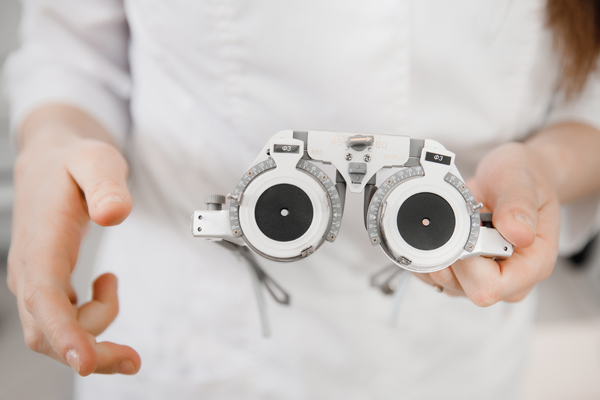Corrective Lenses

People who purchase cheap pairs of reading glasses in stores, may not realize that these are not going to truly help them see more clearly. In fact, wearing glasses that do not have the corrective lens a person needs can damage their eyesight further. Corrective lenses are customized visual aids designed to enhance the weaker aspects of an individual's eyesight.
Corrective lenses address refractive problems such as nearsightedness, farsightedness, presbyopia and astigmatism. Glasses or prescription eyewear rest on the bridge of the nose a short distance from the eyes.
If you are interested in learning more about corrective lenses or want to enhance your vision, give us a call today.
How corrective lenses work
According to the World Health Organization, there are about 253 million people around the globe with some form of vision impairment. Most have preventable and treatable conditions. One of the most effective ways to improve a person's vision is by using prescription lenses.
Even people with 20/20 vision may benefit from wearing corrective lenses. Eyewear can block the blue light from electronic devices, which can lead to eye strain when staring at a screen for long periods of time. A person can develop vision problems when light enters the eyes and does not focus on the proper location in the retina.
The light might shoot too far back in the retina, as is the case with farsightedness. In other cases, the light might be too far in front of the retina, leading to nearsightedness. A person might also have a vision problem if they have a cornea with an abnormal shape. The abnormal shape prevents light from properly focusing on the retina.
A corrective lens has a unique curvature, which is the prescription the optometrist provides for the patient. The curvature focuses the light entering the eyes on the proper part of the retina, leading to clearer vision.
The different types of corrective lenses
There are two main types of corrective lenses: convex and concave. These are also called plus and minus lenses, respectively. A third option is known as compound lenses, which is a combination of both. At Pear Eyewear, our team will take the time to examine the patient and determine which option will work best for their needs.
1. Convex lenses
The surface of a convex lens bulges outward. These types of lenses are sometimes known as converging lenses since they bring parallel rays of light together and focus them on a single location known as the focal point.
Convex lenses are typically a component in devices such as telescopes and binoculars. As an optometrist, we may use a convex lens to treat farsightedness.
2. Concave lenses
Concave lenses are the opposite of their convex counterparts. The surface of the lens curves inward, making parallel rays of light diverge from one another. Concave lenses are sometimes called diverging lenses for this reason. These types of lenses help to treat nearsightedness.
3. Compound lenses and more
It is possible to combine concave lenses with convex lenses to create compound lenses.
Other types of lenses include:
- Multifocal lenses
- Adjustable focus
- Trifocal
- Progressive
- Plano
- Single vision
The optometrist will educate the patient about which type of lenses are best for them after their vision has been evaluated with a comprehensive eye exam.
Check out what others are saying about our services on Yelp: Corrective Lenses in Carmi, IL.
Related Posts
Sunglasses have become a part of many people's wardrobes; however, they are also a great tool for protecting the eyes. Along with playing a large role in our daily lives, eyes are also sensitive to many things—sunlight being one of them. It is easy for one's eyes to sustain damage from direct sunlight exposure. Thankfully,…
If someone is suffering from pink eye, which is also known as conjunctivitis, a visit to the eye doctor may be warranted to confirm the diagnosis. Pink eye is an infection or inflammation of the membrane that lines the eyelid. Common symptoms of this very contagious condition include redness of the eye, itchiness, tearing and…
A comprehensive eye exam does more than assess vision; it can also reveal early signs of various health conditions. Many systemic diseases affect the eyes before other symptoms appear, making regular exams essential to overall health care. Optometrists use advanced diagnostic techniques to detect conditions beyond vision problems, allowing for early intervention and treatment.Routine eye…
When it comes to eye care, understanding the difference between an optometrist and an ophthalmologist is essential in order to receive the appropriate treatment. While both professionals specialize in eye health, their roles, qualifications, and scope of practice vary significantly. Knowing when to consult an optometrist versus an ophthalmologist can ensure that individuals receive the…


